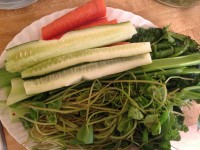By LISA RINO
Karen Ranzi of Ramsey, N.J., was 17 years old when she was inspired to become a vegetarian. Her entire life before that point, she had been a meat eater and consumed dairy. Both her father and grandmother, who were both plant eaters for health and compassion for animals, were a huge factor in her decision. Not soon after, her transformation into a vegan improved her health and lifestyle drastically.
Ranzi was pregnant with her second child during 1989 when she became a vegan, eating mainly vegetables, salads, fruits, and smoothies. Her lifestyle before that consisted of vegetarianism, a life without simply without meat, poultry or pork product. While participating in vegetarianism, Ranzi realized that the vegetarian diet was not enough to prevent health problems, and because it doesn’t take into account the cruelties and harm involved in the consumption of animal products, such as factory farmed dairy and eggs.
“My transition to a vegan lifestyle improved my health and brought with it a strong inter connectedness to all creatures who share this planet with us.” Ranzi says.
Veganism in America
An estimated 7.3 million Americans follow a vegetarian diet, while 1 million follow a vegan diet, according to a 2014 study conducted by “Vegetarianism in America.”
According to Dr. William Sears, a doctor who has been teaching busy families how to raise healthy children for over 40 years, vegetarianism simply means that one is on a plant-based diet. Being a strict vegetarian means that all meat, poultry, fish, dairy products and eggs are avoided completely. Pesco-vegetarians eat fish, dairy products, and eggs along with plant foods.
There are also semi-vegetarians, who small amounts of poultry along with fish, as well as dairy products and eggs. According to the study by Vegetarianism in America, 59 percent are female; 41 percent are male. 42 percent are age 18 to 34 years old; 40.7 percent are 35 to 54; and 17.4 percent are over 55. 57.1 percent have followed a vegetarian diet for more than 10 years; 18 percent for 5 to 10 years; 10.8 percent for 2 to 5 years, 14.1 percent for less than 2 years.
The Benefits
There are various benefits to living a plant-based lifestyle. Karen was able to cure her son’s chronic health problems by transitioning to a vegetarian diet. Dr. Sears shares that vegetarians have a lower risk of colon cancer, as well as stomach, mouth, lung, prostate and bladder cancers. Plant eaters are much more likely to be at risk for diabetes compared to those who eat meat. Vegetarians also have lower cholesterol and lower incidence of cardiovascular disease.
Ranzi was able to cure her son’s chronic health problems by transitioning to a vegetarian diet. Dr. Sears shares that vegetarians have a lower risk of colon cancer, as well as stomach, mouth, lung, prostate and bladder cancers. Plant eaters are much more likely to be at risk for diabetes compared to those who eat meat. Vegetarians also have lower cholesterol and lower incidence of cardiovascular disease.
“My second child was ill with severe asthma, chronic ear infections, and multiple food allergies as a young infant.” Ranzi says, sharing her struggles as a young mother. “At the age of three, we transitioned him to a vegan lifestyle including daily green juicing, green smoothies, and plenty of fruit and vegetables. My son healed from the mucus conditions in just 11 months as a result of this healthy plant-based lifestyle.”

The most important concept is taking in the correct nutrients after cutting meat out of everyday life. Although meat brings most protein, plant based product is just as beneficial. Plant sources include soy products and meat substitutes, legumes, lentils, nuts, seeds and whole grains. In order to get proper calcium, dark green vegetables, such as turnip and collard greens, kale and broccoli, are good plant sources when eaten in sufficient quantities. Calcium-enriched and fortified products, including juices, cereals, soy milk, soy yogurt and tofu, are other options. Iron is also a very important nutrient your body needs. In order to get proper iron intake, eat foods rich in vitamin C, such as strawberries, citrus fruits, tomatoes, cabbage and broccoli. There are also many supplements available for vegetarians, including Vitamins A, B and D.
The American Journal of Clinical Nutrition conducted a study on the health effects of vegan diets. The study concluded that vegans are skinnier, have lower serum cholesterol and have a lower risk of cardiovascular disease. Data from the Adventist Health Study showed that non-vegetarians had a substantially increased risk of both colorectal and prostate cancer than did vegetarians, as well as lower blood pressure.
Reasons to Transition
Although there are many health benefits that lead someone to choosing a vegetarian or vegan lifestyle, many people are more geared toward protecting animals. People believe in the rights of animals, and eating meat includes the slaughtering and butchering of animals, including chickens, cows, turkeys and pigs.
Eggs and dairy also comes from animals, which is why some people choose to be completely vegan, meaning that they do not have dairy products. A popular belief is that people try vegetarianism first, and gradually shift into veganism. Beside the reasons of health benefits and animal rights, the environment is also a reason people become vegetarian.
Excessive amounts of water are used to raise cattle and other farmland animals. This water has the ability to be used for other purposes that would benefit the environment. According to NaturalNews.com, cattle that are raised for consumption produce large amounts of methane, and methane is a greenhouse gas that contributes to global warming.
A Vegan’s Typical Lifestyle
The most important concept is taking in the correct nutrients after cutting meat out of everyday life, says Ranzi. Although meat brings most protein, plant based product is just as beneficial.
Her weekly menu is filled with recipes full of plant based food. “I usually start the day with a large green smoothie, which includes fruit and leafy green vegetables.” Ranzi says, explaining how she starts her day as a vegan. “I eat fruit and greens later in the day, and then have a large salad with a variety of vegetables and an interesting homemade dressing.”

She is also a certified chef, creating many of her own variations of recipes she has seen online. One of her favorite dressings includes her Pistachio dressing, which includes pistachios, the juice from an orange, celery, and the juice of a lime.
Ranzi’s lifestyle is remarkable. With the support of her family and her husband, who is also vegetarian and vegan, they feel the health changes and the benefits have positively affected their lives.
“I have loads of energy, more than I had when I was half my age.” Ranzi says, “I had digestive and skin problems many years ago when I ate dairy and refined sugars. My skin cleared up and I have perfect digestion since I began a simple and healthy vegan lifestyle.”
A Life Worth Changing
John Clarke West Palm Beach, Florida, a health enthusiast who transitioned into a vegetarian lifestyle at the age of 25. He sheds light on the positive changes his body has undergone since transitioning.
Clarke, a New Jersey native realized meat was affecting his life negatively shortly after his 25th birthday. “I remember sitting in my kitchen, and realizing that the meat sitting in front of me looked absolutely disgusting.”
What may sound strange to the average person, Clarke stopped eating meat product not only because he is an animal lover, but because it was slowing down his body. He recalled a point when he was working out in the gym, shortly after eating a large meal from “Five Guys,” a local fast food restaurant in Nanuet. He felt extremely sick, wanting to go home immediately. After doing some research online, Clarke came to the conclusion that meat no longer agreed with his stomach, or his body.
Clarke feels that his body has undergone positive changes since his transition. Having more energy for vigorous physical activity, as well as feeling refreshed and energized after eating a large salad rather than a McDonald’s hamburger.
An Overall Beneficial Lifestyle
Ranzi teaches classes in Ramsey, N.J., on how people can heal and live healthfully as vegans. One important part of the class is the discussion of protein, and that we get plenty of quality protein on vegan foods, especially leafy green vegetables.
There are various ways to begin a vegan lifestyle, including books on veganism; Raw Vegan Recipe Fun for Families and 21 Days of Raw. Ranzi’s website, superhealthychildren.com, along with multiple others such as vegansociety.com, include steps and support to becoming a proper vegan. Ranzi also recommends reading her books located on Superhealthychildren.com, the China Study by Dr. T Colin Campbell, and the World Peace Diet- Eating for Spiritual Health and Social Harmony, by Dr. Will Tuttle.
As a vegan, Ranzi’s most valuable lesson that she has learned is that we must now start to educate others about saving the earth from climate change and the negative affects our planet will suffer from meat and dairy production.
“I highly recommend the vegan lifestyle.” She says, “It can prevent degenerative disease, as well as protecting the lives of animals slaughtered and abused in factory farms. Veganism also eliminates the primary causes of greenhouse gases.”
[Map: Locations of vegetarian and vegan markets and restaurants in New York and New Jersey.]
[Soundslide: Watch Karen Ranzi discuss proper protein.]
http://pages.ramapo.edu/~enegron/Vegan%20Lifestyle/